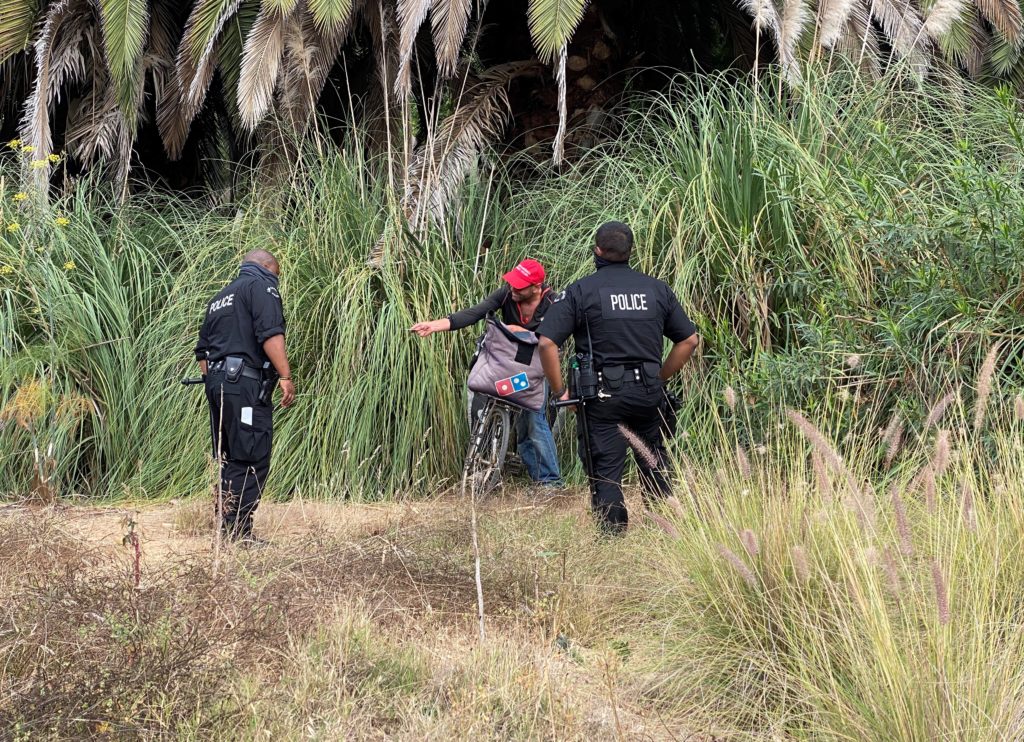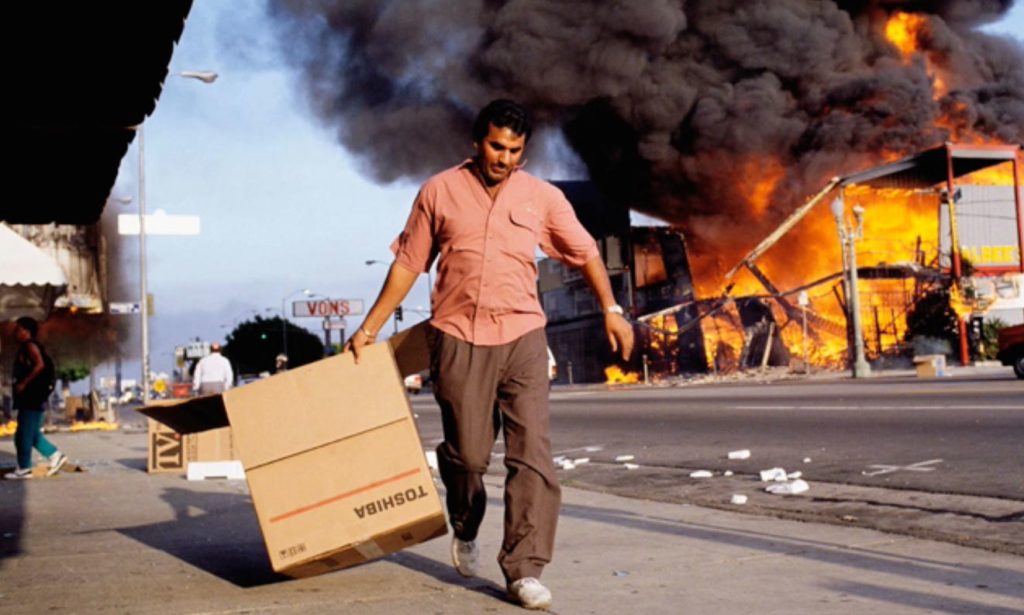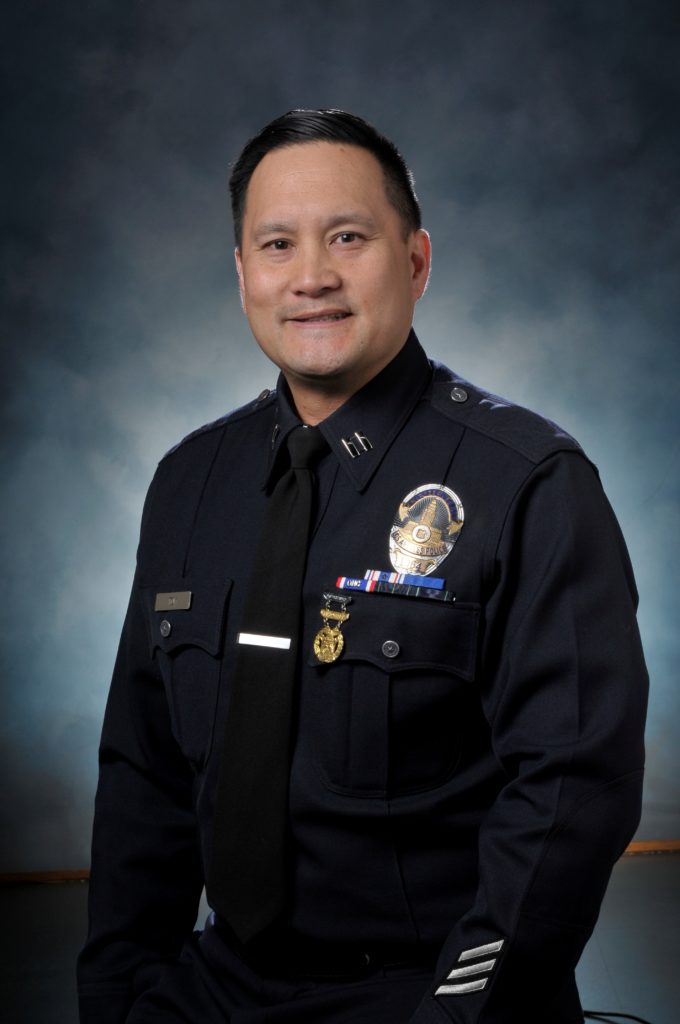LAPD Captain III Jonathan Tom, commanding officer of the West Los Angeles Area, spoke during the Pacific Palisades Community Council Zoom meeting on August 13. He addressed various crime-related issues and what it means having the City Council defund the police by $150 million.
Tom said that last year there were 12 homicides in the West Bureau, and this year there have been 27 to date. He spoke about a family of four from San Diego that had come for the day to Los Angeles. A couple and two kids had just picked up food and were eating in their car. A man on a scooter, went by, then stopped and said, “What are you looking at.” Then he dropped the scooter and put his head in the driver’s window, which was open and asked, “What’s your problem?” The male from San Diego had a gun and killed him.
“The suspect and his girlfriend, cooperated, but the father of the two children was booked for homicide,” said Tom, who warned that “If you are in a circumstance where you meet someone who asks ‘What are you looking at?’ or ‘Are you talking to me?’ Just walk away.”
Grand theft auto is up, more than half of the cars stolen this year had keys in the car. Tom said that the prior week, seven of the 10 car owners said they had left the keys in the car.
“There are less people driving and cars are sitting in the streets,” Tom said. “Criminals are door checking” and looking into the car to see if there’s something to steal. “They take what they can.”
The captain said these thieves may try the ignition and if the fob has been left in the car, they can drive away. “The cars are used for transportation and when they are found, they are generally intact.”
Tom spoke about the mansion party in Beverly Crest on August 4, in which one person was killed and four others injured. There were estimates of about 200 people at the party, and neighbors had called complaining about the noise and traffic. Officers had responded and made contact with the people (some cars were towed) to get them off the streets. LAPD was monitoring that property when the shooting occured.
The following day, Los Angeles Mayor Eric Garcetti authorized the city’s Department of Water and Power to shut down utilities at locations that have hosted big gatherings in the midst of Covid-19 restrictions.
“LAPD is not responsible for shutting off the power,” Tom said in response to a question about dealing with large parties. “We make the referral to the deputy mayor of public safety. Officers can write an administrative citation ($250), and every time they have to report with another citation, the amount doubles up to $8,000.”
He told the PPCC that LAPD is providing extra units on Thursday, Friday and Saturday, specifically to monitor parties. “The response time by officers is faster because of the deployment of extra units. We respond, we give a warning, we cite and then we put up a sign.” (The sign gives an advisement about a Safe LA order.)
Even though the PPCC sent a letter to Councilman Mike Bonin telling him that this community did not support defunding the police, he voted in favor of defunding.
Tom was asked if Pacific Palisades would lose its senior lead officer or its beach detail, which has been vital in helping stop the homeless from camping on brush-covered hillsides in very high fire severity zones. The two-officer beach detail works closely with the Pacific Palisades Task Force on Homelessness and social workers to ensure that the homeless can receive help.

The LAPD Beach Patrol assists the Pacific Palisades Task Force on Homelessness, which has prevented the problem that is apparent in Venice.
Tom didn’t believe our town would lose the senior lead officer (Michael Moore). Regarding the beach detail, “I would fight strongly to keep that car there.”
“We will lose 250 police through attrition that won’t be replaced. We will also lose 150 civilians, which may impact us,” Tom said. “But I don’t have the information about how, yet.”
Palisades resident Matt Rodman is chair of the PACT Police and Community Together committee, a 501(c)3, which can accept donations to help support the West L.A. Police Station. (Send to: PACT c/o WLA Police Station 1663 Butler Ave, Los Angeles CA 90025.)
During Bonin’s earlier town hall, “Reimagining Public Safety,” Gilbert John said, “A lot of calls LAPD is receiving are noncriminal nonviolent calls. They are about substance abuse, mental health. Someone had the nerve to call about people sleeping in a car and it resulted in those two people being killed. Police do not need to be called for a crime of poverty, for a crime of survival.” (Gilbert, who grew up in South Central Los Angeles and who was last incarcerated in 2009, is a lead justice organizer at Community Coalition, which was founded by U.S. Representative Karen Bass in the late 1980s to fight the proliferation of liquor stores in South Los Angeles.)
Tom was asked about the recommendation that certain police responsibilities related to the homeless and mentally ill should be handed over to a civilian force (such as social workers and psychologists).
“We work 24-7,” Tom said, noting that if someone calls about a problem with a neighbor at 9 p.m., “Will a civilian be working?”

Members of the Palisades task force approached the man camping and smoking in a very high fire severity zone near Palisades High School in early August. When volunteers were threatened with a knife, the police were called.
He explained that the police don’t want to be in the position where they have to check out parties and angry partygoers tell them, “Why are you bothering us? Don’t you have something better to do?”
Bonin and Marqueece Harris-Dawson introduced legislation that would direct the Los Angeles Department of Transportation (LADOT) and other city staff to consult with community stakeholders and suggest alternative methods of enforcing traffic laws, such as speeding, illegal turns and other vehicle code violations that do not require armed officers.
Tom was asked about the idea. “Some of the most dangerous situations are when an officer goes up to a car,” he said.
Equally, “Domestic violence has a potential to be extremely dangerous,” Tom said, noting that whoever shows up (if it’s not LAPD) has no ability to protect themselves. “The idea sounds great, but the application will be complicated.”
Residents representing the Palisades wanted to know the most pressing law enforcement issue (superseding drug use, burglary theft from vehicles and theft from local stores): “Will a patrol respond to neighbors partying without a mask?”
“Yes, we will provide advice and try to get people to comply,” Tom said.
Community Council member David Peterson said, “We support the police and we are not unanimous supporters of defund the police.” He wanted to know if defunding the police and the lack of support in some circles makes it difficult for morale.
“I tell officers, don’t get distracted by all the noise,” Tom said. “Think about why you came on this job and hold it to your heart.”
Tom was asked what LAPD needed. “We need more officers and more training,” he said. “We are way understaffed compared to Chicago and New York.”
Captain Tom Discusses LAPD Culture Shift

After the Rodney King Riots, LAPD was put under a federal consent degree until 2013, which monitored the way the department operated in Los Angeles.
Tom, who is Asian American, recalled being pulled over in a car in 1987-1988.
“I was a student at USC and was with a group of Asian Americans headed to Disneyland,” he said.
Tom was driving his mother’s car, which had been reported stolen at one point and recovered. The police pulled him and his buddies out of the car and Tom told his friends, “Just follow directions.”
He was put in handcuffs in the back seat of the police car and he tried to speak to the officer in charge. “Excuse me, but this is an understandable mistake. This is my mother’s car and it’s not stolen.”
The officer responded, “Just shut the f*ck up.”
Tom said he did, but when he spotted a police cadet, he tried again. “Let them know this is my mom’s car,” Tom said and the cadet replied, “Shut the f*ck up.”
This incident helped Tom form his idea about policing and how it could go wrong. “When the cadet treated me like the officer did, I realized it was part of the culture.”
He said that as he has risen through the ranks, “I feel like it’s incumbent on me to change the culture.”
Tom has been with the LAPD since 1996 and he believes “it has changed dramatically. If there’s an officer that missteps, there’s another officer that will step up.”
After the Rodney King-inspired riots in 1992, the Los Angeles Police Department was placed under consent decree with the federal government. It was not lifted until May 2013.
In a 2017 CNN story (“Lessons from the LA Riots: How a Consent Decree Helped a Troubled Police Department Change”), the author wrote: “‘Are there still problems? Oh yeah,’ said Connie Rice, a civil rights attorney who used to regularly sue the department over its practices in minority communities. Today, she works with the LAPD as a consultant. ‘I can show you units that haven’t gotten the memo, but now there are real investigations. Now there is an inspector general. Now the police commission has some tools. It has some power. And the LAPD has accepted civilian rule.’”
Rice continued, “More than 60% of the department was white when residents rioted in 1992. Today, it’s just over 30% white. The department publishes use of force and officer-involved-shooting details online, and 7,000 of its officers will be wearing body cameras by the end of next year. Arrest totals are no longer considered a measure of an officer’s success, and engaging the community is the department’s stated mandate.”

